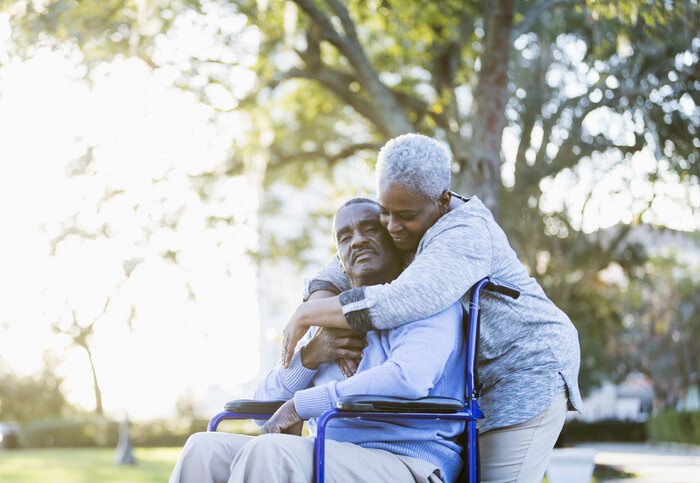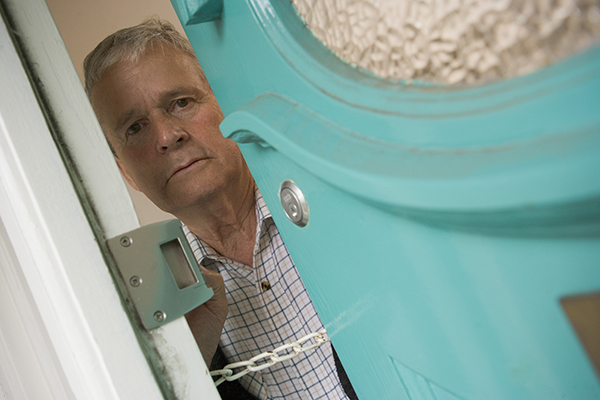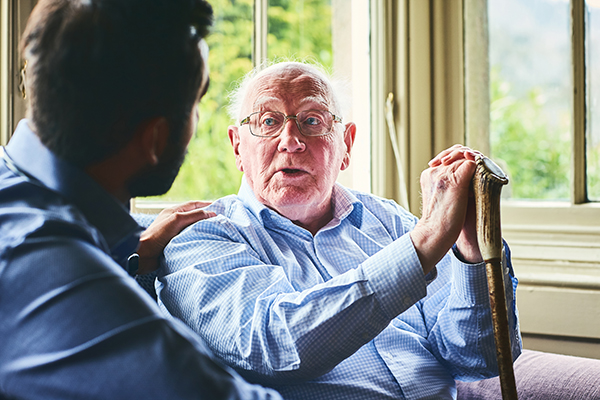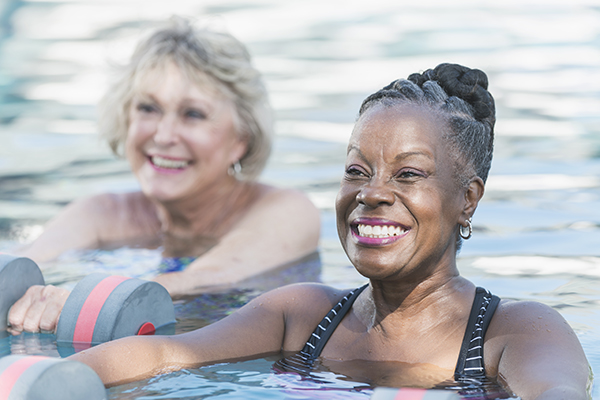Aging
How Artificial Intelligence Is Playing a Key Role in Alzheimer’s Research
Learn about the tool that’s helping expedite Alzheimer’s research.
Alzheimer’s research took a giant leap forward, thanks to a tool that allows pathologists to analyze and classify amyloid plaques and abnormalities in blood vessels through technology similar to face recognition software – leading to the ability to process a vast amount of data in a markedly reduced amount of time.
The study, conducted by UC Davis and UC San Francisco, tested the ability to automate the time-intensive process of reviewing, identifying, and analyzing microscopic amyloid plaques in brain tissue. Dubbed “blob or not,” this digital pathology tool was found to be highly efficient – correctly annotating plaque samples at the unimaginable rate of 2,000 per hour – limited only by the number of processors used in the study. The program was even able to distinguish between different types … Read More »
Caregiving Tips to Ensure You’re Motivating Without Bullying
Make sure you’re not crossing the line from motivating to bullying with these caregiving tips.
As a family caregiver, you obviously encounter an array of feelings throughout the day: shared laughter over a joke with your senior loved one; worry due to a health concern; and certainly, from time to time, irritation. We want only the best for those we love, and if a senior loved one is resistant to doing an activity we realize is beneficial, it could be tough to identify the most appropriate response.
The key is to try to offer motivation and support, while remaining cautious not to ever cross the line into bullying your senior loved one. These caregiving tips are good to remember:
There’s no one-size-fits-all. An approach that has worked on a single occasion may perhaps be entirely ineffective in another. In … Read More »
End-of-Life Care Tip: Participating in Tough Conversations
When providing end-of-life care, one of the best gifts you can offer is a listening ear.
Sharing what’s on our hearts with those we love is never more important than when someone is nearing the end of life. There are often unspoken sentiments and unresolved issues that, once verbalized, can bring peace and a deeper connection with our loved ones in their final days.
As Dr. Jessica Zitter, physician in critical and palliative care medicine at Highland Hospital in Oakland, CA explains, “Those are opportunities for people to take stock and say, ‘I want to be more intentional about how I want to relate to people in my life.’ Death should really be seen as the last opportunity that you have to make amends and clean things up before you’re in the next world, wherever that may be.”
Read More »
4 Ways to Promote Purpose and Meaning for Seniors
Promote purpose and meaning for the seniors in your life with these ideas.
Think of a typical day in the life of a senior loved one. Hopefully it provides several positive and enriching experiences: enjoying breakfast, engaging in a fun hobby or interest, visiting with a friend or family member, watching a favorite TV show. Nevertheless, there’s a difference between positivity and purpose and meaning for seniors; and the need for a life rich with significance and purpose is starting to become more evident, particularly in the life of aging parents.
Viktor Frankl , world-renowned psychiatrist and survivor of the Holocaust, shares poignantly, “What matters is not the meaning in life in general, but rather the specific meaning of a person’s life at a given moment.”
For people whose identity has been focused on a career and raising … Read More »
Wandering in Dementia: Why It’s Happening and How to Help
Wandering in dementia is one of the most difficult effects to manage, and safety is a top concern.
Of all the impacts of Alzheimer’s disease, one of the most alarming is the individual’s tendency for wandering and the potential dangers that may develop if the senior becomes confused or lost. Wandering in dementia can occur any time the older adult is:
Scared, confused, or overwhelmed
Trying to find someone or something
Bored
Trying to maintain a familiar past routine (such as going to work or shopping)
Tending to a simple need (such as searching for a drink of water or going to the bathroom)
The aim is twofold; to help keep your loved one secure, and also to be certain that his/her needs are satisfied to attempt to stop the want to wander to begin with. Consider the following safety measures if your … Read More »
5 Tips to Effectively Manage Paranoia in Seniors
Paranoia in seniors with dementia can be challenging, but these tips can help.
“I’m telling you, there’s a dog in my closet! I hear it growling all night long. We’ve got to track down its owner!”
Listening to a senior loved one express concerns like this that you know to be untrue is distressing – however, not unheard of. Your first instinct may well be to try and rationalize with the person with a response such as, “Nonsense! There is no way a dog could have gotten into the closet!” However, for various reasons, this could be the least effective technique to handle unreasonable thoughts and paranoia in seniors.
Instead, we at Hired Hands Homecare propose the following tactics which will help bring back a sense of calm and wellbeing:
First, schedule an appointment with the senior’s physician. It … Read More »
How to Help Someone with Parkinson’s from a Distance
If you’re wondering how to help someone with Parkinson’s disease when you live out of the area, we have four suggestions for you.
The days when extended families lived together on neighboring plots of land are, unfortunately, a thing of the past in many cases. With loved ones spread apart, it’s not always possible to provide the caring, hands-on care and support that older family members often need, especially when a chronic health condition – like Parkinson’s disease – creates additional concerns.
Yet even from a distance, there are still plenty of ways to assist. The Michael J. Fox Foundation offers these tips on how to help someone with Parkinson’s from afar:
Get organized. Take and keep detailed notes about medications being taken, treatments, emergency contacts, and other aspects of the person’s care needs. A digital version of this … Read More »
How to Find Joy Despite Living with Pain or Chronic Illness
Even while living with pain or chronic illness, it is possible to live a full and joyful life.
Have you ever woken up and said, “It’s definitely going to be one of those days!” Maybe your alarm didn’t go off, the hot water heater decided to stop working, and the dog chewed up one of your favorite shoes overnight. Now consider if each day were “one of those days!” For someone living with pain or chronic illness (and that is the majority of the older adult population), routine struggles and challenges may be a given.
However, there are several steps that the elderly can take to discover and maintain a life of joy, even in the face of chronic illness. For instance:
Follow passions. Discovering purpose and meaning in every day is essential – and achievable. Many older adults … Read More »
This Lifestyle Change Can Turn Back Time to Improve Heart Health
Improve heart health with this one simple lifestyle change!
In our younger years, physical activity was a given. Our days were filled with participating in sports programs, recess on the playground, and games of tag with friends. All of this naturally gave our heart the workout it needed to stay healthy. But as we grow older, a more sedentary lifestyle can settle in – having serious repercussions on our hearts, including stiffness, a decreased efficiency in oxygen production, and an elevated risk of heart disease and failure. Is there anything we can do to improve heart health and possibly even restore its functioning to what it was when we were younger?
How To Encourage Doctor Visits for Seniors
Learn how to help a reluctant senior follow through with doctors’ visits.
Let’s face it: a lot of us delay going to the doctor’s office. It could be somewhat uncomfortable, and downright distressing when something is wrong and we’re looking at the prospect of an unwanted diagnosis. Even so, we understand it’s wise to complete what’s best for our health and wellbeing and to be diligent about receiving necessary medical care.















